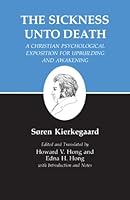# The Sickness Unto Death

## Metadata
- Author: [[Søren Kierkegaard, Howard Vincent Hong (Editor), Edna Hatlestad Hong (Editor)]]
- Full Title: The Sickness Unto Death
- Category: #books
## Highlights
- “If man did not have absolute need of God, he could not (1) know himself—self-knowledge, (2) be immortal.”17 ([Location 115](https://readwise.io/to_kindle?action=open&asin=B00BNY0RZ0&location=115))
- The kind of scholarliness and scienticity that ultimately does not build up is precisely thereby unchristian. ([Location 407](https://readwise.io/to_kindle?action=open&asin=B00BNY0RZ0&location=407))
- Such is the relation between the natural man and the Christian; it is like the relation between a child and an adult: what makes the child shudder and shrink, the adult regards as nothing. The child does not know what the horrifying is; the adult knows and shrinks from it. ([Location 452](https://readwise.io/to_kindle?action=open&asin=B00BNY0RZ0&location=452))
- the person who without affectation says that he is in despair is still a little closer, is dialectically closer, to being cured than all those who are not regarded as such and who do not regard themselves as being in despair. ([Location 680](https://readwise.io/to_kindle?action=open&asin=B00BNY0RZ0&location=680))
- The self is composed of infinitude and finitude. However, this synthesis is a relation, and a relation that, even though it is derived, relates itself to itself, which is freedom.26 The self is freedom. ([Location 709](https://readwise.io/to_kindle?action=open&asin=B00BNY0RZ0&location=709))
- The self is the conscious synthesis of infinitude and finitude that relates itself to itself, whose task is to become itself, which can be done only through the relationship to God. ([Location 720](https://readwise.io/to_kindle?action=open&asin=B00BNY0RZ0&location=720))
- if the self does not become itself, it is in despair, whether it knows that or not. Yet every moment that a self exists, it is in a process of becoming, ([Location 723](https://readwise.io/to_kindle?action=open&asin=B00BNY0RZ0&location=723))
- Infinitude’s despair, therefore, is the fantastic, the unlimited, for the self is healthy and free from despair only when, precisely by having despaired, it rests transparently in God. ([Location 734](https://readwise.io/to_kindle?action=open&asin=B00BNY0RZ0&location=734))
- The law for the development of the self with respect to knowing, insofar as it is the case that the self becomes itself, is that the increase of knowledge corresponds to the increase of self-knowledge, that the more the self knows, the more it knows itself. ([Location 750](https://readwise.io/to_kindle?action=open&asin=B00BNY0RZ0&location=750))
- a self is the last thing the world cares about and the most dangerous thing of all for a person to show signs of having. ([Location 769](https://readwise.io/to_kindle?action=open&asin=B00BNY0RZ0&location=769))
- But whereas one kind of despair plunges wildly into the infinite and loses itself, another kind of despair seems to permit itself to be tricked out of its self by “the others.” Surrounded by hordes of men, absorbed in all sorts of secular matters, more and more shrewd about the ways of the world—such a person forgets himself, forgets his name divinely understood, does not dare to believe in himself, finds it too hazardous to be himself and far easier and safer to be like the others, to become a copy, a number, a mass man. ([Location 785](https://readwise.io/to_kindle?action=open&asin=B00BNY0RZ0&location=785))
- the person who knows what is genuinely appalling fears most of all any mistake, any sin that takes an inward turn and leaves no outward trace. ([Location 799](https://readwise.io/to_kindle?action=open&asin=B00BNY0RZ0&location=799))
- If I have ventured wrongly, well, then life helps me by punishing me. ([Location 802](https://readwise.io/to_kindle?action=open&asin=B00BNY0RZ0&location=802))
- To become is a movement away from that place, but to become oneself is a movement in that place. ([Location 826](https://readwise.io/to_kindle?action=open&asin=B00BNY0RZ0&location=826))
- When a self becomes lost in possibility in this way, it is not merely because of a lack of energy; at least it is not to be interpreted in the usual way. What is missing is essentially the power to obey, to submit to the necessity in one’s life, to what may be called one’s limitations. ([Location 836](https://readwise.io/to_kindle?action=open&asin=B00BNY0RZ0&location=836))
- The believer has the ever infallible antidote for despair—possibility—because for God everything is possible at every moment. This is the good health of faith that resolves contradictions. The contradiction here is that, humanly speaking, downfall is certain, but that there is possibility nonetheless. ([Location 891](https://readwise.io/to_kindle?action=open&asin=B00BNY0RZ0&location=891))
- To lack possibility means either that everything has become necessary for a person or that everything has become trivial. ([Location 895](https://readwise.io/to_kindle?action=open&asin=B00BNY0RZ0&location=895))
- The person who, with a realization that suicide is despair and to that extent with a true conception of the nature of despair, commits suicide is more intensively in despair than one who commits suicide without a clear idea that suicide is despair; conversely, the less true his conception of despair, the less intensive his despair. ([Location 1038](https://readwise.io/to_kindle?action=open&asin=B00BNY0RZ0&location=1038))
- The opposite to being in despair is to have faith. ([Location 1045](https://readwise.io/to_kindle?action=open&asin=B00BNY0RZ0&location=1045))
- a state in which there is no despair at all, is entirely correct, and this formula is also the formula for faith: in relating itself to itself and in willing to be itself, the self rests transparently in the power that established it ([Location 1045](https://readwise.io/to_kindle?action=open&asin=B00BNY0RZ0&location=1045))
- This form of despair is: in despair not to will to be oneself. Or even lower: in despair not to will to be a self. Or lowest of all: in despair to will to be someone else, to wish for a new self. ([Location 1088](https://readwise.io/to_kindle?action=open&asin=B00BNY0RZ0&location=1088))
- Youth has the illusion of hope; the adult has the illusion of recollection, ([Location 1173](https://readwise.io/to_kindle?action=open&asin=B00BNY0RZ0&location=1173))
- Christianly understood, every poet-existence (esthetics notwithstanding) is sin, the sin of poetizing instead of being, of relating to the good and the true through the imagination instead of being that—that is, existentially striving to be that. ([Location 1481](https://readwise.io/to_kindle?action=open&asin=B00BNY0RZ0&location=1481))
- sin is despair (for sin is not the turbulence of flesh and blood but is the spirit’s consent to it) and is: before God. ([Location 1564](https://readwise.io/to_kindle?action=open&asin=B00BNY0RZ0&location=1564))
- Admiration is happy self-surrender; envy is unhappy self-assertion. ([Location 1632](https://readwise.io/to_kindle?action=open&asin=B00BNY0RZ0&location=1632))
- the lower nature’s power lies in stretching things out. ([Location 1761](https://readwise.io/to_kindle?action=open&asin=B00BNY0RZ0&location=1761))
- Sin itself is severance from the good, but despair over sin is the second severance. ([Location 1998](https://readwise.io/to_kindle?action=open&asin=B00BNY0RZ0&location=1998))